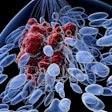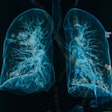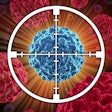
Researchers in China have identified proteins in the blood that may help show which patients with cancer of the gastrointestinal (GI) tract are responding to programmed cell death 1 (PD-1) checkpoint immunotherapy and, conversely, which ones are at risk of developing hyperprogressive disease (HPD) and will have worse outcomes. Results were reported in JAMA Network Open on July 24.
Hyperprogressive disease -- or rapid tumor expansion -- is an effect of immune checkpoint blockade drug therapy that has been getting more attention in recent years with the rising use of PD-1 inhibitors across tumor types. It is distinct from pseudoprogression, where there is tumor growth initially with immunotherapy treatment, but it is followed by a response.
In a prospective study, the researchers examined levels of serum proteins for 56 patients undergoing treatment with immune checkpoint inhibitors for metastatic GI cancer and assessed cases of hyperprogressive disease. They checked for 59 factors, including cytokines/chemokines and checkpoint-related proteins in serum samples, using multiplexed bead immunoassays (Procarta models, Affymetrix) performed before and after treatment.
The following baseline serum levels were associated with hyperprogressive disease, which was reported in five patients:
- Significantly lower mean levels of monocyte chemoattractant protein 1
- Lower leukemia inhibitory factor levels
- Higher cluster of differentiation 152 levels
The prognosis for patients with hyperprogressive disease is "dismal" and there is no known biomarker for predicting this effect, wrote the group led by Dr. Zhihao Lu, PhD, of the Peking University Cancer Hospital and Institute in Beijing (JAMA Netw Open, July 2019, Vol. 2:7, e197621).
"Therefore, it is imperative to identify novel biomarkers that are associated with HPD and response to [immune checkpoint blockade] in patients with metastatic GI tract cancer," the authors wrote.
Lu and colleagues also reported that patients with metastatic esophageal squamous cell carcinoma or colorectal cancer who responded to treatment had larger decreases in interleukin-1 (IL-1) receptor antagonist levels compared with nonresponders. In gastric cancer, responders had bigger increases in brain-derived neurotrophic factor levels than nonresponders.
The response rate with PD-1 immunotherapy in GI tract cancers ranges from 10% to 30%, and evidence is growing that "GI tract cancers with different histopathological and biological features exhibit distinct behaviors, leading to different treatment responses," they wrote.
"A panel of serological biomarkers may help oncologists identify patients with hyperprogressive disease before immune checkpoint blockade therapy and predict immune checkpoint blockade responses at an early stage, thereby providing an opportunity for early intervention," Lu et al wrote.
However, more prospective studies are needed to further investigate the findings, they concluded.

















